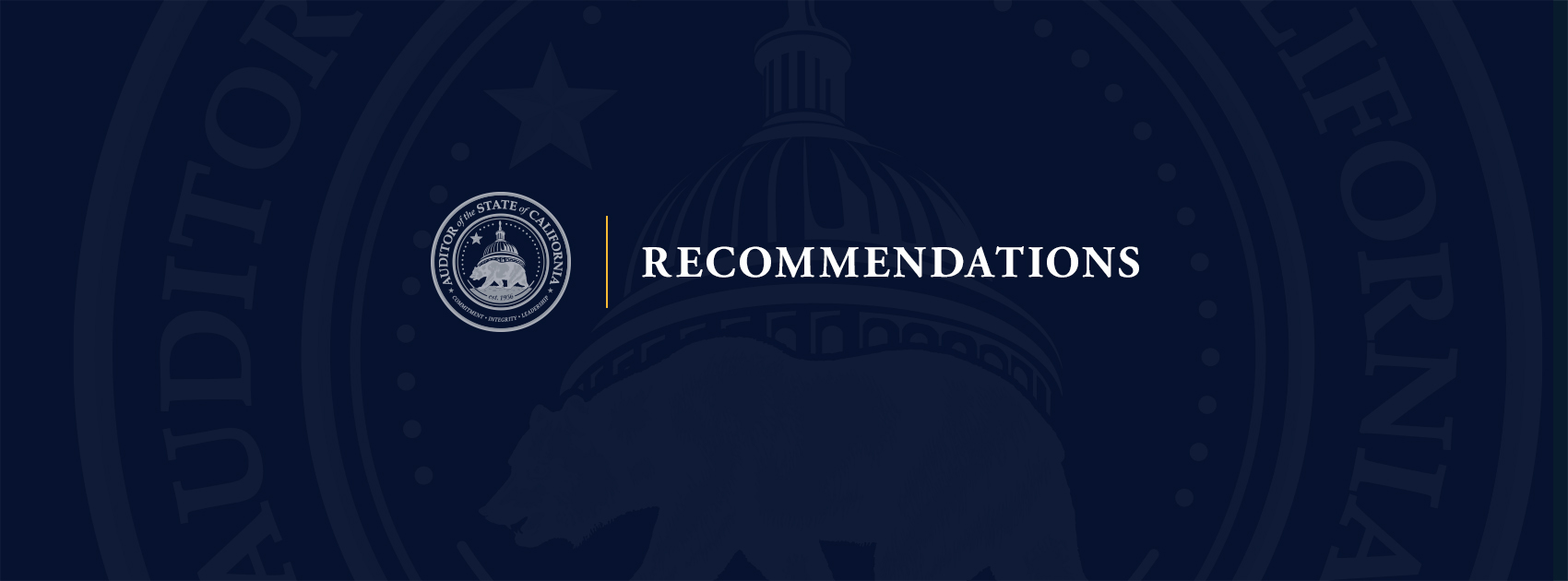
2023-129 Tropical Forest-Risk Commodities
The State Could Better Ensure That It Does Not Contribute to Tropical Deforestation
Published: August 27, 2024
Audit Recommendations Disclosure
When an audit is completed and a report is issued, auditees must provide the State Auditor with information regarding their progress in implementing recommendations from our reports at three intervals from the release of the report: 60 days, six months, and one year. Additionally, Senate Bill 1452 (Chapter 452, Statutes of 2006), requires auditees who have not implemented recommendations after one year, to report to us and to the Legislature why they have not implemented them or to state when they intend to implement them. Below is a listing of each recommendation the State Auditor made in the report referenced and a link to the most recent response from the auditee addressing their progress in implementing the recommendation and the State Auditor’s assessment of auditee’s response based on our review of the supporting documentation.
Recommendation 1
If the Legislature determines that reducing the State’s possible contributions to tropical deforestation is a priority, the Legislature should improve the State’s commitment to sustainability by requiring DGS to expand its EPP program in the following ways:
- Amend the authorizing statute for EPP to explicitly include tropical deforestation as program criteria.
- Expand DGS’s list of recommended third-party certifications to include certifications that eliminate or reduce procurement of products that contribute to tropical deforestation.
- Develop specific goals for the State’s procurement of EPP products and services.
Agency response status:
Not fully implemented
Date of implementation:
N/A
State Auditor assessment status:
No action taken
60-Day Agency Response
As of 10/26/24 the Legislature has not taken any action in the 2024/25 Legislative Session to address this specific recommendation.
6-Month Agency Response
As of 2/25/25 the Legislature has not taken any action in the 2025/26 Legislative Session to address this specific recommendation.
1-Year Agency Response
As of 8/27/25 the Legislature has not taken any action in the 2025/26 Legislative Session to address this specific recommendation.
To better empower consumers to base their purchasing decisions on companies’ efforts to eliminate slavery and human trafficking from their supply chains, the Legislature should amend the Transparency Act in the following ways:
- Eliminate the provision that requires FTB to supply to the Attorney General’s Office a list of the companies that must comply with the Act.
- Revise the provisions that determine which companies are subject to the Act, such that it no longer depends on tax return information that necessitates the involvement of FTB. For example, it could align the Act with similar provisions in the CCPA. Specifically, it could require that the Transparency Act apply to companies that operate in California and maintain an annual gross revenue in excess of $25 million.
- Authorize the Attorney General’s Office to use additional enforcement measures as necessary to achieve the goals of the Act by issuing administrative penalties, empower the agency to access records needed to determine whether a company is subject to the Act, and enable the Attorney General’s Office to investigate possible violations of the Act upon receiving a sworn complaint or on its own initiative.
- Require companies to disclose on their websites the dates their disclosures were last updated.
- Require the Attorney General’s Office to identify and publish all known Transparency Act disclosures as a public registry on its website by August 2025.
- If the Legislature first addresses the weaknesses in the Act, require companies that are subject to the Transparency Act to include in their public transparency disclosures their efforts, if any, to eliminate tropical deforestation from their supply chains.
Agency response status:
Not fully implemented
Date of implementation:
N/A
State Auditor assessment status:
No action taken
60-Day Agency Response
As of 10/26/24 the Legislature has not taken any action in the 2024/25 Legislative Session to address this specific recommendation.
6-Month Agency Response
As of 2/25/25 the Legislature has not taken any action in the 2025/26 Legislative Session to address this specific recommendation.
1-Year Agency Response
As of 8/27/25 the Legislature has not taken any action in the 2025/26 Legislative Session to address this specific recommendation.